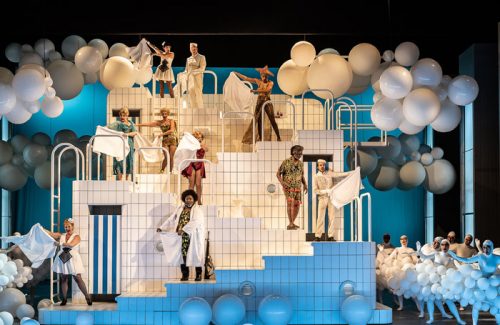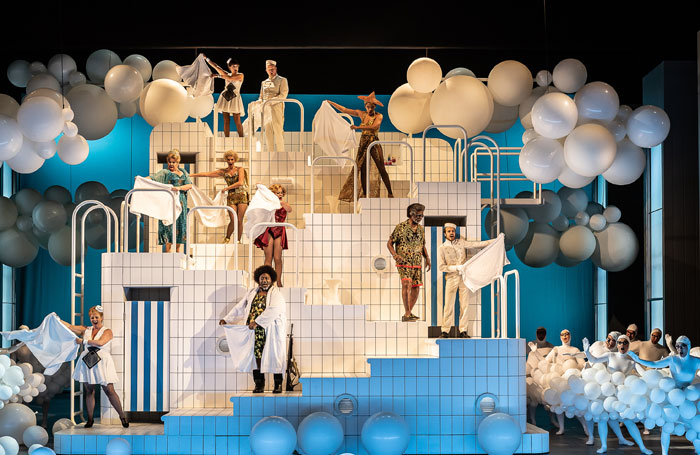 United Kingdom Offenbach, Orpheus in the Underworld: Soloists, Chorus and Orchestra of English National Opera / Sian Edwards (conductor). London Coliseum, 11.10.2019. (JPr)
United Kingdom Offenbach, Orpheus in the Underworld: Soloists, Chorus and Orchestra of English National Opera / Sian Edwards (conductor). London Coliseum, 11.10.2019. (JPr)

Production:
Director – Emma Rice
Set designer – Lizzie Clachan
Costume designer – Lez Brotherston
Lighting designer – Malcolm Rippeth
Choreography – Ella Murfitt
Cast:
Orpheus – Ed Lyon
Eurydice – Mary Bevan
Public Opinion – Lucia Lucas
Jupiter – Sir Willard White
Juno – Anne Marie-Owens
Pluto/Aristaeus – Alex Otterburn
John Styx – Alan Oke
Cupid – Ellie Laugharne
Mars – Keel Watson
Venus – Judith Howarth
Diana – Idunnu Münch
French opéra comique developed into operetta in the middle of the nineteenth century and this mashup of theatre and light opera was soon adopted by some noted Austrian and German composers, and Vienna – rather than Paris – became the epicentre of operetta productions. I am Viennese by heritage and my first exposure to it was at the Volksoper in the later 1960s where the English soprano Adele Leigh was its star performer. Operetta is basically insubstantial musical fun and frolics which does not take itself too seriously, yet often carries a social message that would have been recognisable to its first audiences.
Offenbach’s 1874 Orpheus in the Underworld satirised the rule of Napoleon III in the reprehensible antics of Jupiter and the other gods of Olympus. It makes fun of the ancient myth of Orpheus and Eurydice: Orpheus here is a simple violin teacher keen to get rid of his wife. Eurydice dies when bitten by a snake and is taken to Hades by the god of the underworld, Pluto, who is a master of disguise. Orpheus is spurred on by Public Opinion into attempting to rescue her using the power of his music. Jupiter has taken a shine to Eurydice and orders Orpheus not to look back at her when they both leave the underworld. However (spoiler alert) he creates a lightning bolt and when Orpheus is startled and turns around in surprise Eurydice vanishes to become a priestess of Bacchus.
Emma Rice is new to opera or operetta and unfortunately just does not ‘get it’. She drags Orpheus in the Underworld kicking and screaming into our current post-#MetToo era. However, showing a female character as the victim – in a way the original composer never envisioned – is already becoming ‘old hat’. Sometimes going to the opera house (or the theatre) should enable the audience to leave all their worries in the foyer. Orpheus in the Underworld can still have political and social relevance without being bleached of all its inherent charm. Here we begin in London in 1957 and at the start we race through Orpheus and Eurydice meeting, getting married, and after their baby is stillborn, Eurydice has a hard time coming to terms with this and leaves Orpheus. She is seduced by a shepherd, Aristaeus (Pluto), and becoming part of a peep show in old Soho is her ‘hell’ and she is now prey to the dirty mac brigade. To her credit Rice does turn her staging of the famous can-can into a thought-provoking display about the objectification of women.
In her programme interview Rice disparages the Carry On films for their ‘attitude to women as commodities’. I seriously wonder how many she has seen as although the men often ogled women they rarely got the girl and in fact – something Rice clearly seems unaware of – the films held up a humorous mirror to the depressed and repressed Britain of the 1950s and 1960s particularly. It is precisely this approach – or that of the pomposity-pricking antics of the legendary Marx Brothers – that Rice should have copied. Then she would have had a production that could fill the London Coliseum (this won’t) or be revivable (very unlikely).
Nevertheless, ‘freely adapted’ from the original – with Rice’s book and Tom Morris’s lyrics – and however misconceived it all is in my opinion, Rice’s approach also seems half-hearted. There are some dazzling costumes (from Liz Brotherston), as well as, an extravagant Hollywood pool party for the Olympian gods, yet the sleaze is never remotely sleazy enough for everything the director expresses in her interview. Elsewhere, there is much ‘balloonography’ from the chorus, whether as sheep or clouds, and a London taxi trundles on and off at times or is lifted by balloons to Olympus.
This was only my second Orpheus in the Underworld and the last was in the mid-1980s, also from English National Opera, and I have no memory of that. All I know is that when I look down the list of singers involved – headed by the inimitable Émile Belcourt – they would have had a better upbringing in light-hearted musical comedy than ENO’s current cast. Undoubtedly, they were hardworking and often appeared to be imploring the audience to enjoy themselves more than I suspect they really were. Alex Otterburn lacked any real charisma for the chameleon Pluto; he had a permanent smirk and reminded me strongly of the late Rik Mayall. Equally the veteran Willard White did a great impression of Morgan Freeman playing God. To see White – a former wonderful Wotan – singing lines like ‘When I wiggle my bum, my wings begin to hum’ created in me a frisson of disquiet. All credit to Mary Bevan for her musical orgasm when Jupiter’s fly buzzes in to seduce her in her Act II hovel and throughout she was totally committed physically and vocally to Rice’s Konzept.
Ed Lyon proved an appealing Orpheus, and Lucia Lucas, a trans female baritone, was equally superb in the role of the taxi-driving Public Opinion (‘The Knowledge’), although the portrayal owed a lot to another Lucas, Matt! There was luxury casting throughout the remainder of the experienced cast comprised of Anne-Marie Owens (a harridan Juno), the impressive Idunnu Münch (a sultry Diana), Ellie Laugharne (a perky Cupid), Judith Howarth (a self-obsessed Venus), the stentorian Keel Watson (a militaristic Mars) and Alan Oke (a seedy drunken John Styx).
In a stop-start performance – because there seemed more talking than singing – Sian Edwards and the ENO Orchestra did okay without bringing any great energy or sparkle to Offenbach’s score that might have invigorated matters on stage.
Jim Pritchard
For more about future ENO performances click here.
